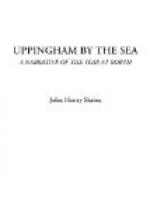The next day, May 1st, is the Uppingham Encoenia, the commemoration of the Chapel opening. It forced one to contrast the wooden walls in which the Saint’s-day’s service was held, with the high rooftree and the deep buttresses, which this year would not echo the chanting procession. The anniversary rites lapsed of necessity. An accidental piece of ceremony marked this day; for that morning a flagstaff was erected on the terrace in front of the hotel, and a flag run up, by the lowering of which the hour of dinner or roll-call could be signalled to ramblers on the shore or the hill. On the 19th of the month we hoisted with much cheering our own colours: a banner, on which some of the ladies had worked the Founder’s device, the antique schoolmaster and his ring of scholars. The flags (there were three in all) were carried home with us, and the faded and tattered folds which had fought with the sou’-wester, now droop in a graceful canopy at one end of the great school-room.
By the middle of June the new church of Borth, so opportunely built in time for our settlement, was declared ready. It was courteously placed at our disposal for two services on Sunday before the hours of the parish services. The building exactly held us, with a little pinching. The first occasion of our using it was a confirmation held by the Bishop of St. David’s. The Bishop, whose early connections are with this neighbourhood, and who had already in his capacity of landowner given us proof of his goodwill, seemed to rejoice in the occasion of expressing his sympathy with the immigrants into his quiet home. The kindness of the visit was not slight; for the journey, to and fro, from difficulties of transport, demanded two days. We have the more reason to be grateful for his willing sacrifice of time, because, in view of the interval since the last confirmation and of the long sojourn in Wales before us, we should otherwise have suffered a kind of mitigated excommunication.
June 29th and 30th were the days of the “Old Boys’ Match,” the annual reunion of the Past and Present School. There seemed no reason why absence from our native soil should sever our ties with the Past. Quite the contrary. Ubi Caesar ibi patria, thought our Old Boys, who, indeed, never before felt so glad to claim their heritage in the fortunes of Uppingham. The game, which was like other games of cricket, and need not be described, was played on the Gogerddan field, where the Headmaster, in lieu of his customary supper, not practicable at Borth, gave a luncheon each day. On the first day, as the company rose from table, a signal was given to the school to draw up to the tent, outside which the guests were standing. They formed a kind of hollow square to see what would happen, and an old Uppinghamian (Mr. R. L. Nettleship, Fellow of Balliol College, Oxford) came forward and presented an “Address from the Old Boys at Oxford, to the Headmaster and Masters of Uppingham School.”




